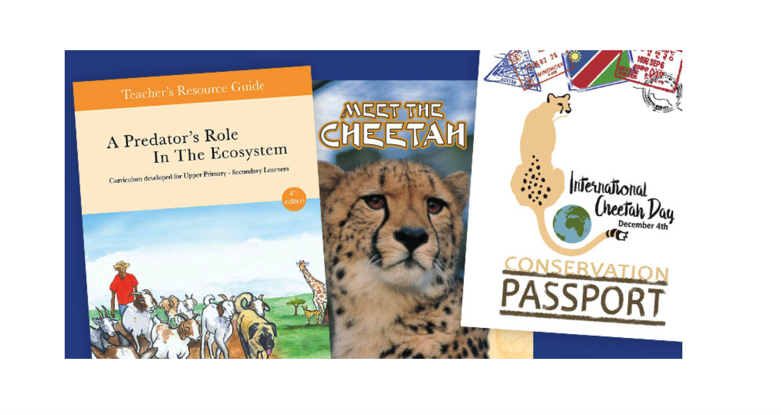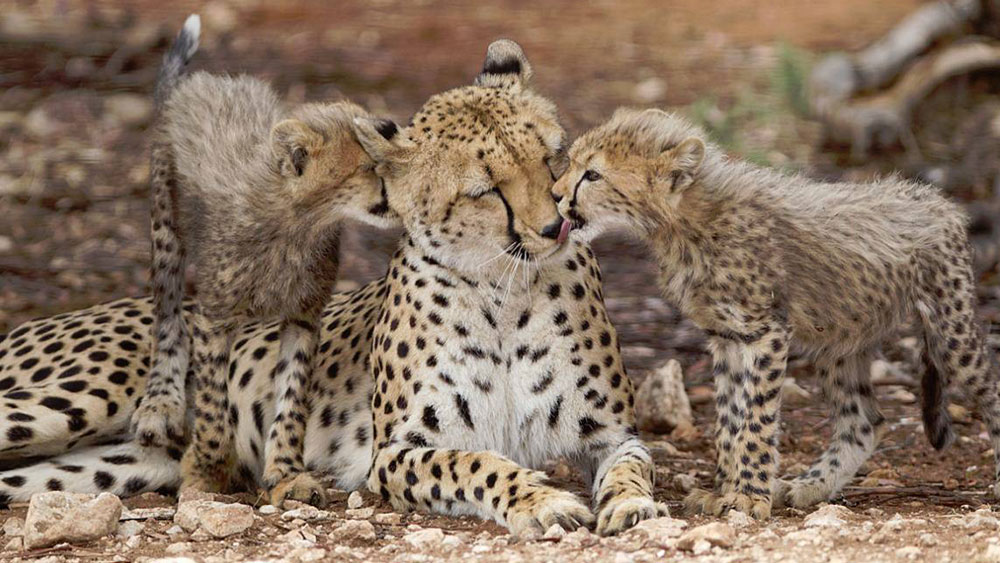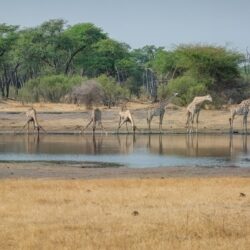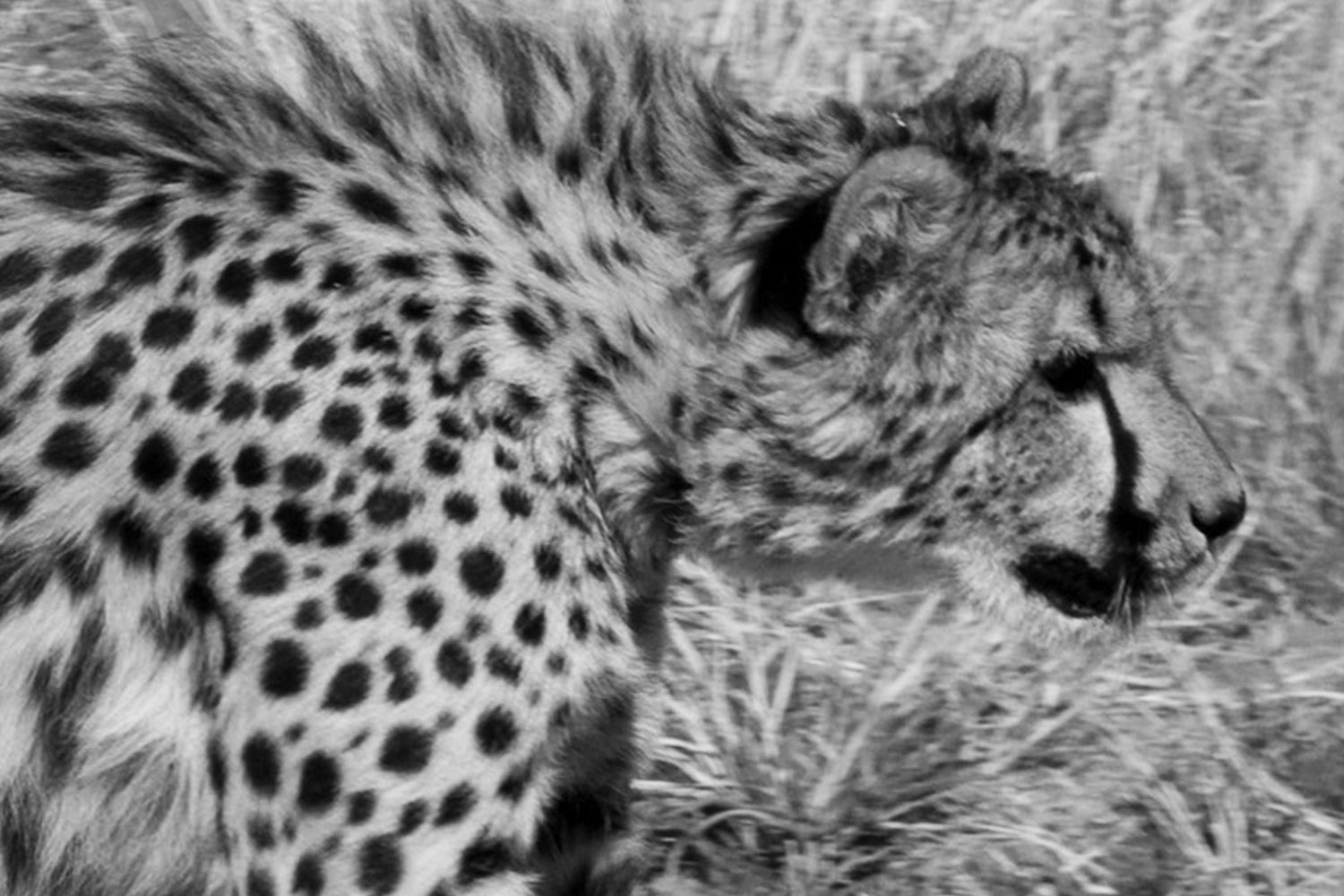CCF updates from Dr. Laurie Marker (Part Two)
-

- by Meredith Hanel October 15, 2020

Canadians recently participated in an event with Dr. Laurie Marker over Zoom where she looked back over the 30 years of CCF and highlighted successes and challenges including those brought on by COVID-19. There are so many exciting paths that CCF is taking to fulfill its mission to save cheetahs! In Part One of this blog post, I highlighted the history of CCF from the very beginning and CCF’s strategy of working with people to find ways to deal with human-wildlife conflict, and the unexpected growth of CCF into an important training ground for interns in a wide range of vocations. Here, I will share Marker’s news about CCF’s work in education, livestock guarding dogs, cheetah research, reintroduction of cheetahs into the wild, and the fight against the cheetah pet trade.
One of the first things Marker wanted to do at CCF was to get young people involved through education programs. “We developed an entire curriculum around the cheetah and the predator’s role in the ecosystem”, says Marker called Future Conservationists of Africa Program. CCF teaches about 25,000 school kids a year and their program travels throughout Africa.
Due to COVID-19, CCF couldn’t welcome visitors and so their educational programs were shut down. Because of this, CCF has put all of their educational materials online. Teachers and educators in Canada and anywhere are invited to use these fantastic educational resources. Now that things are beginning to open up, Marker is hoping that visitors will start coming back with masking and physical distancing in place.

Internship programs at CCF train veterinarians, scientists, conservationists and more. Many of their interns returned home in March when COVID-19 lockdowns hit but a few stayed on. When some of CCF’s previous interns were faced with their universities being closed, they asked and were allowed to return to CCF during the pandemic. Although COVID-19 stopped CCF’s ecotourism, they were able to keep their ecotourism staff on doing other jobs like feeding and caring for cheetahs in their sanctuary. Throughout the pandemic, CCF has continued to be allowed to go out and train farmers on predator-friendly farming practices. CCF is classified as essential services.
One predator-friendly practice is the use of livestock guarding dogs. CCF has bred and placed nearly 700 livestock guarding dogs on farms over 25 years. The dogs are raised with livestock and when they grow up their instinct is to protect them. Farmers from all over the world, including Canada and the United States, are following CCFs lead on using these dogs to protect livestock from predators. Since the dogs are as large as a predator and bark loudly, they act as a deterrent for predators. We heard one of CCF’s dogs barking during Marker’s presentation. I guess he wanted to give us a demonstration. Livestock guarding dogs reduce livestock loss by 80-90% which goes a long way in reducing conflict between farmers and cheetahs.
There are fewer than 7500 cheetahs left in the world, and 50 percent of those cheetahs are in Namibia and Botswana. CCF works to save cheetahs all throughout Africa. Somaliland is where CCF fights illegal pet trade and takes care of confiscated cheetahs at their holding centre in Somaliland. CCF has built three safe houses. CCF will be setting up a wildlife sanctuary for these cheetahs by the end of the year on land granted to them by the Somaliland government. Unfortunately, cheetahs rescued from the pet trade are usually not able to be put back into the wild because they need so much human care that they become very habituated to humans. These cheetahs will live in the new sanctuary and be used for educational programs that may change people’s attitudes about cheetahs.
CCF prefers to reintroduce cheetahs into the wild whenever possible and they have had some great success stories. Jacomina is a cheetah that came to CCF as an orphan but succeeded in mating with a wild cheetah and giving birth to two cubs, Shandy and Savanna. Marker recalled how our own Carolyn Farquhar, CCF Canada’s Chair, helped put satellite collars on Jacomina’s cubs during a visit. Shandy grew up and had a litter of her own. CCF can often tell when a cheetah is giving birth because satellite collar signals stop moving around. Having a second generation born in the wild really demonstrates the success of their rehabilitation program. CCF’s methods may be used to reintroduce cheetahs to countries like India where cheetahs have been absent for about 60 years.

CCF’s genetics lab banks blood, tissue, sperm and scat samples to research gene flow in cheetah populations. Research techniques developed at CCF in collaboration with the Smithsonian Conservation Biology Institute were used to produce the first cheetah cubs by in vitro fertilization to a surrogate mother at Columbus Zoo this past February.
Another CCF project that may seem removed from the cheetah at first glance is CCF’s Biomass Program which utilizes thornbush. Marker learned from farmers that thornbush overgrowth makes farmland unusable. Desperate farmers saw cheetahs and thornbush as two threats to their livelihoods, and cheetahs were the easier one to kill. Initially CCF began removing thornbush and using it to produce Bushblok wood fuel briquettes. But in response to a drought they had this year, CCF started making feed for livestock out of the thornbush. Marker is hoping that by early next year they could be using thornbush to generate electricity.
While the ultimate goal of CCF is to save cheetahs in the wild, CCF really works with people in communities where cheetahs live. In Canada, we value our wild animals and we should look to CCF as an example of how to maintain a healthy ecosystem where humans and predators coexist. Whether the cheetah is your favourite animal or not, there are so many amazing CCF endeavors to follow, share and support. Which one grabs you? Let us know at Canada@cheetah.org.
Related Reading
-
November 16, 2024
Cheetah Keepers – All About the Cheetahs! -
October 4, 2024
World Animal Day 2024 -
May 22, 2024
It’s International Day for Biological Diversity!



